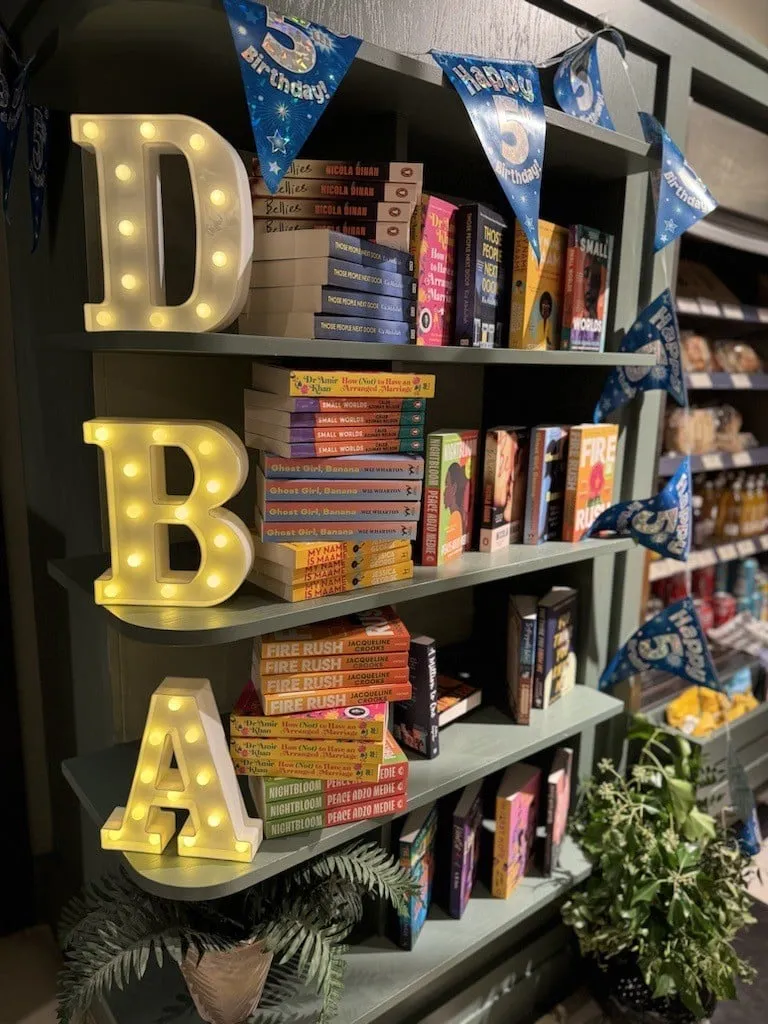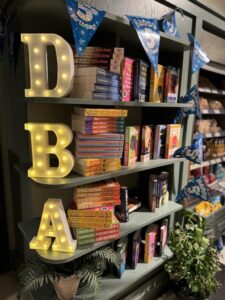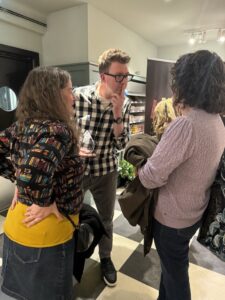October 31, 2024
Following his recent win at the 2024 Diverse Book Awards, we reached out to young adult author, Simon James Green, whose book Boy Like Me won the Readers’ Choice Award in the YA category. We discussed the profound impact of representation in literature, the importance of supportive figures like librarians, and Simon’s reflections on LGBTQ+ identity and acceptance, both in the past and present. Join us as we explore his journey and insights into creating meaningful stories for young readers.
Boy Like Me won the Readers’ Choice Award in the YA category at this year’s Diverse Book Awards. Congratulations! How did it feel when you found out that readers had chosen your book?
Whenever readers vote for a book, it’s the most amazing thing, because the idea that the book has resonated with that many people is so lovely. You never know when you write a book if it’s going to reach people in any kind of way, and if it’s going to mean much to them. One of the things I’ve discovered with this book is that it seems to have resonated with both adults and teenagers. Because it’s a historical novel set in the mid-90s, I wasn’t sure if it would appeal to the teenage young adult readers when I wrote it, but it really has. I think the reason for that is because they can see a lot of the things that were going on back then happening again now. It’s history repeating. That brings me no joy, but I’m glad it’s out there so that those readers can find it and hopefully find some comfort in it.
Can you tell us more about the “kind librarian” who helps Jamie? What role do you see librarians or books playing in the lives of young people who are discovering their identities?
The book is set in a time where the UK had enacted legislation known as Section 28, which had the effect of banning all LGBTQ+ books from school libraries. The story of Boy Like Me really kicks off when Jamie, the main character who is in denial about his sexuality, is given a book by the school librarian which would have been banned at the time because it’s a gay romance novel. When Jamie reads this book, he sees himself represented on the page for the first time. It’s a powerful life changing moment for him and it’s all kicked off by this brilliant school librarian who identifies this unspoken need in him and knows that’s the book that is going to unlock something for Jamie and help him realise that he’s not alone. She plays a crucial role in the whole story, because she’s the catalyst for everything that happens after that. Through all the bad things that take place in the book, she’s also there as a support, even putting her own job and future on the line in the name of freedom of speech. That character was inspired by my school author visits, which are always organised by these brilliant librarians who run the most fantastic spaces at their school. Through lunchtimes and at break times these libraries become a safe haven for kids who like books, but also for all of the young people who maybe don’t feel like they fit in for whatever reason, and want somewhere to go that’s a little bit safer or quieter. I really wanted to celebrate the people who make that happen because libraries aren’t libraries without librarians – you can’t just have a room full of books. When you’ve got an actual librarian in charge who knows their students well, knows what they want or need to read, knows what’s appropriate for them, it’s such a powerful thing. And so really, I guess the whole book is kind of a love letter to school librarians, and to everything they do.
Your book reflects a time when LGBTQ+ issues were largely invisible in mainstream culture. How do you see the representation of LGBTQ+ characters in YA literature today, compared to the period in which your book is set?
The book is semi-autobiographical. When I was at school in the mid-90s there were no LGBTQ+ books in the school library whatsoever – there were no gay characters, no LGBTQ+ storylines, there was nothing. It was like LGBT people just didn’t exist whatsoever. This wasn’t just in the library either, it was also never mentioned in any classes or lessons at school apart from in the most derogatory terms. The only books that were around back then were usually the novels aimed at adults you could find in bookshops. There would occasionally be a corner of books with gay and lesbian fiction written over the top of it on one shelf, and if you were brave enough, you might go over and have a quick look through. But of course, in doing so, you were sort of outing yourself in the process. Now, when I look at how many brilliant books we’ve got with LGBTQ+ rep across all genres – thrillers and romcoms, adventure stories, stories where the representation is more incidental, coming out stories, people taking their first steps into realising who they are… It’s really heartening to see.
Was there a particular scene or moment in the book that was especially difficult to write, or one that came naturally to you because of your own experiences?
There are quite a few scenes of homophobic abuse, as well as scenes where various book banners and individuals say horrific things to justify their position and their approach to why they think these books should be banned. Those moments were based on various real-life experiences that happened to me, either at school, while growing up, or even in recent years. As a visible author of LGBT fiction, I have faced a fair amount of abuse directed at me online in the past. It was important to me that these experiences were featured in the book because one of the inspirations for it was my realisation—having written five or six happy LGBT romcoms with happy endings—that people who want to take us back to those terrible days are still out there. I became aware of a rising tide of anti-LGBT hate that started on Twitter and permeated through other social media platforms; it was a rhetoric and language that I remembered from the 90s. Those moments are always hard to write because they remind me of how bad it can be out there. At the same time, they were also relatively easy to write due to the amount of experience I’ve had with it. The other aspects I really enjoyed writing was the growing romance between the boys. There’s always a lot of fun in finding moments of joy and togetherness.
Do you have plans to write more stories that explore similar themes, or are there other projects you’re currently working on that you’d like to share?
I’ve just had a book published with Barrington Stoke called The Big Ask which is a really fun romcom. I think it’s so important that we make sure the books are out there with LGBTQ+ representation that is accessible for everyone, including dyslexic readers or those kids who perhaps don’t enjoy reading or just want a shorter, easier book that’s a bit less daunting.. So, I was really pleased they asked me to write that for them. It’s a really fun book, but it does also touch on homophobia and the issues that that young gay teenagers have to deal with in schools from their peers or their parents. Also, one thing that is coming out next year, which hasn’t been announced yet, but we can probably mention, is a non-fiction book I’ve curated for Magic Cat called A Year of Pride and Joy. It features 52 LGBTQ+ people talking about whatever brings them joy in about 150 words – one entry for every week of the year. It features people from all walks of life, so, we’ve got a few celebrities in there like Tom Daley and Miriam Margolyes, for example, but also scientists, educators, activists, and a detective, amongst others. It’s aimed at the middle years market and has been such a joy to work on.
What should companies like ours in EdTech do in line with our mission to ‘See Every Student’ from an author’s perspective?
It’s about championing diverse books, getting them out there and doing everything we can across the whole industry to make them visible and to promote them and talk about them. Things like this interview are a prime example of giving the books some extra time, extra space to be seen, because that’s what’s needed. It’s important that big companies really put their weight behind diverse books because it tells people that they’re not afraid to support marginalised voices, even when there’s push-back. Ultimately, young people need to understand themselves, and they need to understand the diverse world in which they are living. And preparing them for that, well, that’s what education is all about – stepping outside the bubble of your own existence and having your eyes opened to different lives and experiences.
- Boy Like Me has been quizzed for Accelerated Reader – Quiz no. 270059 Upper Years Book Level 4.9
- Follow us on our social channels for more author interviews, book recommendations and product updates: @AccReader on X and Accelerated Reader UK on Facebook
- Follow Simon on socials to keep up with the conversation and see what’s next: @simonjamesgreen on X and Instagram


